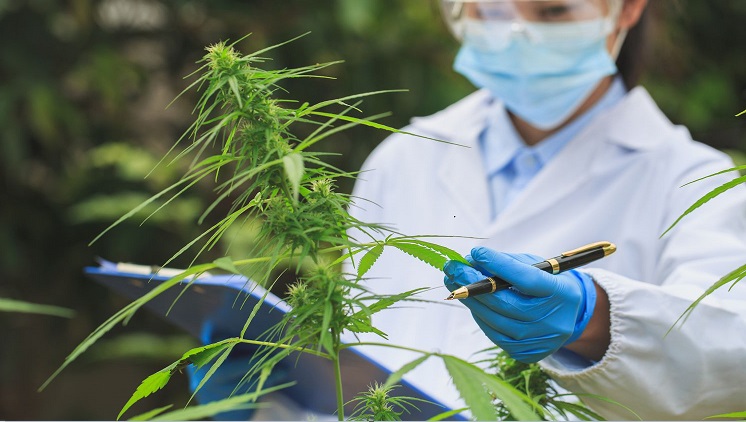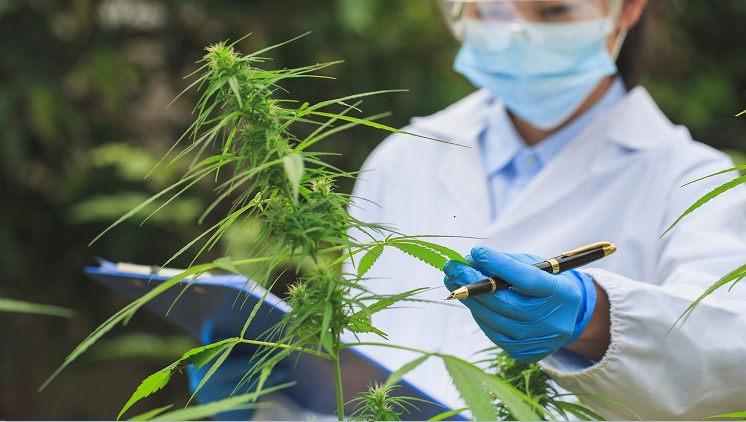We use cookies to make your experience better. To comply with the new e-Privacy directive, we need to ask for your consent to set the cookies. Learn more.
Medical Cannabis Laws in the UK: Introducing Oli.Clinic by Olivastu
Is Medical Cannabis Legal in the UK?

The legal landscape surrounding medical cannabis in the United Kingdom has undergone significant changes in recent years, sparking curiosity and confusion among patients and healthcare professionals alike. This comprehensive guide aims to shed light on the current state of medical cannabis legislation in the UK, exploring its history, accessibility, and potential future developments.
As we delve into this topic, it's crucial to approach it with an open mind and a willingness to learn. The world of medical cannabis is complex and ever-evolving, with new research and regulations emerging regularly. So, let's embark on this journey together, unravelling the intricacies of medical cannabis laws in the UK and what they mean for patients seeking alternative treatment options.
The Evolution of Cannabis Laws in the UK
The story of cannabis legislation in the United Kingdom is a tale of changing attitudes and evolving understanding. Let's take a stroll through history to see how we arrived at our current position.
From Panacea to Prohibition
Believe it or not, there was a time when cannabis was not only legal but also widely celebrated in the UK. Back in the 19th century, this versatile plant was hailed as a cure-all for a variety of ailments. Doctors prescribed it for everything from joint pain to seizures, and it was even touted as a potential remedy for cholera and tetanus.
However, the winds of change began to blow in the early 20th century. Attitudes shifted, and by 1928, cannabis found itself on the wrong side of the law. The 1920 Drugs Act officially outlawed the substance, marking the beginning of a long period of prohibition.
The Classification Conundrum
Fast forward to 1971, and we see cannabis being classified as a Class B substance under the Dangerous Drugs Act. This classification placed it alongside amphetamines and barbiturates, reflecting the prevailing attitudes of the time.
Interestingly, there was a brief period at the turn of the millennium when cannabis was downgraded to a Class C drug. However, this reclassification was short-lived, and it soon returned to its Class B status, where it remains today.
The Turning Point: 2018
The year 2018 marked a significant milestone in the UK's approach to cannabis. In a groundbreaking move, it became legal for doctors to prescribe medical cannabis. This change opened up new possibilities for patients and healthcare providers alike, although, as we'll see, accessing these prescriptions isn't always straightforward.
Current Legal Status of Medical Cannabis in the UK
Now that we've traced the historical path, let's focus on the present. What exactly is the legal status of medical cannabis in the UK today?
The Legality of Prescribed Medical Cannabis
As of 2018, medical cannabis is legal in the UK, but only when prescribed by a registered healthcare professional. This means that patients can access cannabis-based medicines through either the NHS or private clinics, provided they meet specific criteria.
The Importance of Prescription
It's crucial to understand that possessing cannabis without a valid prescription remains illegal. Even if you're using it for medicinal purposes, cannabis obtained from any source other than a licensed pharmacy with a doctor's prescription is considered illicit and could lead to legal consequences.
Forms of Legal Medical Cannabis
When we talk about legal medical cannabis in the UK, we're not referring to the stereotypical image of someone smoking a joint. Legal medical cannabis comes in various forms, including:
- Oils
- Capsules
- Sprays
- Flower (for vaporisation, not smoking)
Each of these forms is designed for specific medical applications and must be used as prescribed by a healthcare professional.
Accessing Medical Cannabis in the UK
So, medical cannabis is legal with a prescription, but how does one go about getting that prescription? Let's break down the process.
NHS vs Private Clinics
There are two primary routes to accessing medical cannabis in the UK: through the NHS or via private clinics.
NHS Prescriptions
Getting a medical cannabis prescription through the NHS is, to put it mildly, challenging. The National Institute for Health and Care Excellence (NICE) has set strict guidelines for NHS prescriptions, limiting them to a handful of specific conditions.
To be eligible for an NHS prescription, patients must:
- Have one of four specific conditions (more on these later)
- Have tried at least two other treatments without success
- Be referred to a specialist doctor by their GP
- Have the specialist determine that medical cannabis is the best option
Given these stringent criteria, it's no surprise that NHS prescriptions for medical cannabis are rare. In fact, in 2019, only 18 people received such prescriptions.
Private Clinics
Private clinics, on the other hand, have more flexibility in prescribing medical cannabis. They can consider a wider range of conditions and symptoms, making this route more accessible for many patients.
However, it's important to note that private prescriptions come with their own set of challenges, including higher costs and the need to find a reputable clinic.
Eligible Conditions
The list of conditions eligible for medical cannabis treatment varies depending on whether you're seeking an NHS or private prescription.
NHS Eligible Conditions
The NHS currently considers medical cannabis for:
- Certain types of epilepsy
- Chemotherapy-induced nausea and vomiting
- Spasticity in multiple sclerosis
- Chronic pain (in specific circumstances)
Private Clinic Eligible Conditions
Private clinics may consider prescribing medical cannabis for a broader range of conditions, including:
- Chronic pain
- Anxiety disorders
- PTSD
- Insomnia
- Fibromyalgia
- Arthritis
- Migraines
- And more
It's worth noting that research into the efficacy of medical cannabis for various conditions is ongoing, and this list may expand in the future.
The Prescription Process
Obtaining a medical cannabis prescription involves several steps. Let's walk through the process to give you a clear picture of what to expect.
Step 1: Initial Consultation
Whether you're going through the NHS or a private clinic, the first step is usually an initial consultation. This may be with your GP (for NHS route) or a specialist at a private clinic.
During this consultation, you'll discuss your medical history, current symptoms, and treatments you've tried in the past. Be prepared to provide detailed information about your condition and how it affects your daily life.
Step 2: Specialist Referral (NHS) or Assessment (Private)
If you're pursuing the NHS route, your GP will need to refer you to a specialist if they believe you might be eligible for medical cannabis. This specialist will then assess your case in more detail.
For private clinics, the initial consultation may be with a specialist who can directly assess your eligibility for medical cannabis treatment.
Step 3: Treatment Plan Development
If the specialist determines that medical cannabis could be beneficial for your condition, they'll work with you to develop a treatment plan. This plan will outline:
- The type of cannabis-based medicine recommended
- Dosage and administration instructions
- Frequency of use
- Follow-up appointments and monitoring
Step 4: Prescription and Dispensing
Once your treatment plan is in place, you'll receive a prescription for medical cannabis. This prescription must be filled at a licensed pharmacy that stocks cannabis-based medicines.
Step 5: Ongoing Monitoring and Adjustments
Medical cannabis treatment isn't a one-and-done deal. You'll need regular follow-up appointments to monitor your progress and make any necessary adjustments to your treatment plan.
Types of Medical Cannabis Products Available in the UK
When we talk about medical cannabis in the UK, we're referring to a range of products, each with its own characteristics and applications. Let's explore the main types you might encounter.
Cannabis-Based Medicines
These are pharmaceutical-grade products that have been approved for use in the UK. They include:
-
Sativex: A mouth spray containing both THC and CBD, primarily used for treating spasticity in multiple sclerosis.
-
Epidyolex: An oral solution containing CBD, used to treat certain forms of epilepsy.
-
Nabilone: A synthetic cannabinoid used to treat nausea and vomiting caused by chemotherapy.
Unlicensed Cannabis-Based Products
In addition to the licensed medicines above, doctors can prescribe unlicensed cannabis-based products when they believe it's in the patient's best interest. These might include:
-
Cannabis oils: Concentrated extracts that can be taken orally or sublingually.
-
Cannabis flower: Dried cannabis buds that can be vaporised (not smoked) for medicinal use.
-
Cannabis capsules: Containing either CBD, THC, or a combination of both.
CBD Products
It's worth noting that CBD (cannabidiol) products derived from hemp with less than 0.2% THC are legally available over the counter in the UK. However, these are not considered medical cannabis and are regulated differently.
Challenges and Controversies
While the legalisation of medical cannabis in the UK was a significant step forward, it hasn't been without its challenges and controversies. Let's examine some of the key issues.
Limited NHS Access
As we've discussed, accessing medical cannabis through the NHS is extremely difficult. This has led to frustration among patients who believe they could benefit from cannabis-based treatments but are unable to access them.
Cost Barriers
For many patients, private prescriptions are the only viable route to accessing medical cannabis. However, the costs associated with private consultations and prescriptions can be prohibitive for some.
Lack of Clinical Evidence
One of the main reasons for the limited availability of medical cannabis on the NHS is the lack of large-scale clinical trials demonstrating its efficacy for many conditions. This is slowly changing, but progress is slow.
Stigma and Misconceptions
Despite its legal status as a medicine, cannabis still carries a stigma in some circles. Misconceptions about its use and effects can create barriers to acceptance and access.
Driving and Employment Concerns
Patients using medical cannabis may face challenges related to driving and employment, as current laws and workplace policies may not adequately account for prescribed cannabis use.
The Future of Medical Cannabis in the UK
As we look to the future, what can we expect for medical cannabis in the UK? While predicting the future is always tricky, there are some trends and developments worth noting.
Expanding Research
Ongoing research into the efficacy of medical cannabis for various conditions is likely to continue. This could potentially lead to expanded access and new treatment options.
Policy Evolution
As more data becomes available and public attitudes continue to shift, we may see changes in policy regarding medical cannabis. This could include easier access through the NHS or changes to driving and employment laws.
Product Development
The pharmaceutical industry is likely to continue developing new cannabis-based medicines, potentially leading to more options for patients and healthcare providers.
Education and Awareness
Efforts to educate both the public and healthcare professionals about medical cannabis are likely to increase, potentially reducing stigma and improving access.
Conclusion
The journey of medical cannabis in the UK has been a long and winding one, from widespread acceptance in the 19th century to prohibition and now to cautious reintegration into the healthcare system. While medical cannabis is indeed legal in the UK, access remains limited and complex.
As we've explored, patients seeking medical cannabis face a variety of challenges, from strict NHS criteria to the high costs of private prescriptions. However, for those who can access it, medical cannabis offers a potential alternative when other treatments have failed.
Looking ahead, the landscape of medical cannabis in the UK is likely to continue evolving. Ongoing research, changing attitudes, and potential policy shifts could all shape the future of this controversial yet promising area of medicine.
Whether you're a patient considering medical cannabis, a healthcare professional looking to understand the current landscape, or simply a curious observer, we hope this guide has provided valuable insights into the complex world of medical cannabis in the UK.
Remember, if you're considering medical cannabis as a treatment option, it's crucial to consult with a qualified healthcare professional. They can provide personalised advice based on your specific medical history and needs.
As we at Oli.Clinic prepare to launch our medical clinic, we're committed to staying at the forefront of developments in medical cannabis. We believe in the potential of this treatment and are dedicated to providing our patients with the most up-to-date, evidence-based care possible.
The story of medical cannabis in the UK is far from over. As research progresses and policies evolve, we'll be here to keep you informed every step of the way. After all, when it comes to your health, knowledge truly is power.




![[Review] Weed the People - The New Netflix Documentary on Medical Cannabis](https://www.olivastu.com/media/magefan_blog/Featured23.jpg)
![[Review] Super Lemon Haze: Genetics, Effects, Medical & Growing](https://www.olivastu.com/media/magefan_blog/Super_Lemon_Haze.jpg)